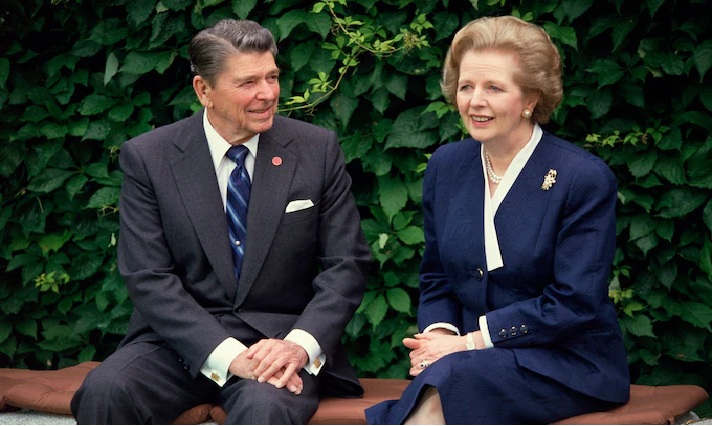David Frost
When we think of the 1980s, we think of two political giants, Margaret Thatcher and Ronald Reagan, and their pursuit of freedom – rolling back socialism and the state at home, and standing up to communism abroad. The intellectual and political victory they won was so complete as to seem permanent.
Their close partnership seemed a natural consequence of the close Anglo-American alliance. They didn’t agree on everything, but they were certainly driven by the same free-market, anti-collectivist worldview. It also seems relevant at this particular moment to mention their Christian beliefs, which underpinned their emphasis on individualism, personal responsibility, and on right and wrong as a guide to action.
This strong Anglo-American partnership was a core element of Western strength and Western ideas. But it seems to be fading fast. In particular, the exchange of ideas between conservatives here and in the US, the sense of intellectual cross-fertilisation, is the weakest I remember. I think that’s a problem. Why is this happening? One problem is the rapid leftward shift of the US political centre of gravity. Until quite recently not just Republicans, but also Democrats, were credible centre-Right parties by European standards. That’s no longer true of the Democrats, and the intellectual debate in the US has changed as a result.
The powers of recovery in US society are strong, but for Americans to turn away from this leftward trend the Right must get its act together. And that is the other problem. In the UK, Conservatism has also drifted left, both economically and culturally. Although different wings of the parliamentary party have different perspectives, it has not been possible to resist the general trend towards high tax-and-spend combined with social liberalism.
In the US, conservative politics is going in a different direction. Traditional Republicanism, derided by some as “Chamber of Commerce Republicanism” for supporting US business rather than US citizens, is declining. The view in the ascendant is what’s called “national conservatism” – the growing resistance to the zeitgeist by those who do not see decline as inevitable, and want to revive the US nation state and confidence in its history and culture. These conservatives want more freedom and more free speech, equality of opportunity not of outcome, a push-back on neo-Marxist “woke” views, proper border controls, a restrained foreign policy but one which sees China as a hostile power, and a revival of the productive power of the US economy. For many, there is also a strong religious component, not so much the familiar gospel evangelicalism but conservative forms of Catholicism, Christianity more broadly, and Judaism.
President Trump gave voice to some (not all) of these views, though he didn’t create them. They were given coherence by a group of intellectuals, centred around the Israeli-American professor Yoram Hazony. Now, they are arguably becoming mainstream: at the 2022 “NatCon” conference, Florida governor Ron DeSantis was the keynote speaker. The head of America’s biggest think tank on the right, the Heritage Foundation’s Kevin Roberts, told delegates: “We [Heritage] are not asking you to join our movement; we are here to join yours.” The problem for Anglo-American conservatism is that these ideas are relatively counter-cultural still in the UK. The connection with Trump and all the associated baggage doesn’t help. It’s also true that some in the NatCon movement advocate politics which free marketeers like me are less comfortable with, like industrial policy, protectionism, and isolationism. There is a cultural element, too. Even now, British Conservative politicians aren’t always comfortable with an aggressive “anti-woke” agenda, and tiptoe around the language of nation and country that comes naturally to Americans.
But they need to be less purist and engage with the politics of our great friend and ally as they are, rather than as we would like them to be. There is clearly some overlap between national conservative ideas and those advocated in these columns, ideas with which actual and potential Conservative voters, particularly new 2019 voters, seem to have quite a bit of sympathy. That is why I am speaking at the first “NatCon” conference in the UK in May, along with other UK politicians including Michael Gove, Miriam Cates and Danny Kruger. I do so also because we have to get comfortable talking about the politics of nationhood. Brexit is a constitutional and economic project to revive our nation state, to bring back home the power to build our own society in our own way, or it is nothing. British conservatism will never be identical to America’s. But both varieties are rooted in the same traditions, of freedom, individualism, and limited but effective government controlled by the people. That’s why it is troubling, indeed sad, that they risk drifting apart. Conservatives of all kinds will, I hope, do all they can to bring them back together.







